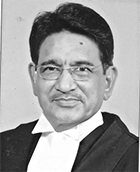
Meet Justice R. M. Lodha and his Notable Judicial decisions
Justice Rajendra Mal Lodha, born on September 28, 1949, in Jodhpur, served as the 41st Chief Justice of India from April 27, 2014, to September 27, 2014. Before his elevation to the Supreme Court in 2008, he served as Chief Justice of the Patna High Court and as a judge in the Rajasthan and Bombay High Courts. Over his six-year Supreme Court tenure, Justice Lodha authored 273 judgments, with a focus on criminal, constitutional, and public interest matters.
Judicial Career and Philosophy
Justice Lodha was known for his commitment to judicial independence, transparency in appointments, and the speedy disposal of cases. He advocated for reforms to reduce the backlog of cases and modernize the judiciary, emphasizing access to justice for all. Even after retirement, he continued to influence legal reforms, notably through the Lodha Committee, which recommended sweeping changes in the governance of Indian cricket.
Landmark Judgments
1. Coal Block Allocation Case (2014)
Justice Lodha led the bench that declared all coal block allocations made by the government between 1993 and 2010 illegal and arbitrary. This judgment exposed corruption and lack of transparency in the allocation process, leading to the cancellation of numerous coal blocks and reshaping India’s coal sector.
2. Subramanian Swamy v. Director, CBI (2014)
As Chief Justice, Lodha presided over the five-judge constitutional bench that struck down Section 6A of the Delhi Special Police Establishment Act, which required government permission to investigate senior bureaucrats. The Court held this provision unconstitutional, reinforcing the principle of equality before the law and strengthening anti-corruption efforts.
3. People’s Union for Civil Liberties v. State of Maharashtra (2014)
Justice Lodha laid down comprehensive guidelines for investigating police encounters, mandating that all such incidents undergo independent investigation. This judgment aimed to curb extra-judicial killings and protect the right to life under Article 21.
4. Recognition of Transgender Rights
Justice Lodha was part of the bench that recognized transgender individuals as a “third gender,” affirming their fundamental rights and directing the government to ensure their social, educational, and economic inclusion.
5. Telecom and Corporate Cases
He was involved in the cancellation of 122 telecom licenses in the 2G spectrum case due to irregularities, and in the Sahara-SEBI case, ordering Sahara to refund billions to investors. He also participated in the Vodafone tax dispute, ruling in favor of Vodafone on jurisdictional grounds.
Legacy
Justice R.M. Lodha is remembered for landmark rulings on corruption, equality, and transparency, and for his efforts to reform both the judiciary and sports governance in India. His judgments and post-retirement work continue to influence legal and institutional reforms across the country.












comments